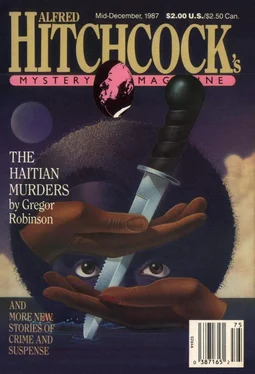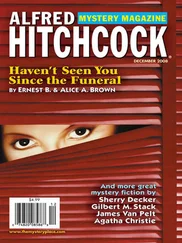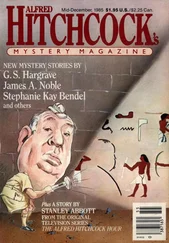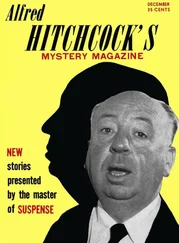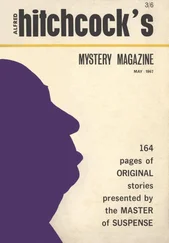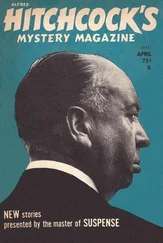Doug Allyn - Alfred Hitchcock’s Mystery Magazine. Vol. 32, No. 13, Mid-December, 1987
Здесь есть возможность читать онлайн «Doug Allyn - Alfred Hitchcock’s Mystery Magazine. Vol. 32, No. 13, Mid-December, 1987» весь текст электронной книги совершенно бесплатно (целиком полную версию без сокращений). В некоторых случаях можно слушать аудио, скачать через торрент в формате fb2 и присутствует краткое содержание. Город: New York, Год выпуска: 1987, ISBN: 1987, Издательство: Davis Publications, Жанр: Детектив, Триллер, на английском языке. Описание произведения, (предисловие) а так же отзывы посетителей доступны на портале библиотеки ЛибКат.
- Название:Alfred Hitchcock’s Mystery Magazine. Vol. 32, No. 13, Mid-December, 1987
- Автор:
- Издательство:Davis Publications
- Жанр:
- Год:1987
- Город:New York
- ISBN:ISSN: 0002-5224
- Рейтинг книги:5 / 5. Голосов: 1
-
Избранное:Добавить в избранное
- Отзывы:
-
Ваша оценка:
- 100
- 1
- 2
- 3
- 4
- 5
Alfred Hitchcock’s Mystery Magazine. Vol. 32, No. 13, Mid-December, 1987: краткое содержание, описание и аннотация
Предлагаем к чтению аннотацию, описание, краткое содержание или предисловие (зависит от того, что написал сам автор книги «Alfred Hitchcock’s Mystery Magazine. Vol. 32, No. 13, Mid-December, 1987»). Если вы не нашли необходимую информацию о книге — напишите в комментариях, мы постараемся отыскать её.
Alfred Hitchcock’s Mystery Magazine. Vol. 32, No. 13, Mid-December, 1987 — читать онлайн бесплатно полную книгу (весь текст) целиком
Ниже представлен текст книги, разбитый по страницам. Система сохранения места последней прочитанной страницы, позволяет с удобством читать онлайн бесплатно книгу «Alfred Hitchcock’s Mystery Magazine. Vol. 32, No. 13, Mid-December, 1987», без необходимости каждый раз заново искать на чём Вы остановились. Поставьте закладку, и сможете в любой момент перейти на страницу, на которой закончили чтение.
Интервал:
Закладка:
“What’s the matter?” the little imp said. “Something wrong? You okay?”
“This... this... this... fuddy-duddy,” stammered poor Bob Swillet, once lucky orphan, “does it... he... have a name?”
“Of course he does,” said the painted hussy, giggling nervously — what the hell’s the matter with this old bastard? “It’s... it’s... wait’ll I check the sheet... oh yeah, Spillet or Spigot, something like that. Listen, I don’t have all day. If you can’t afford a quarter, just say so. It doesn’t matter.”
“I’m the fuddy-duddy who’s retiring,” hissed Bob Swillet. “The name is Swillet, not Spillet. Now get out of here before...”
“Oh my God,” the squirt squealed. “Oh God, I’m sorry.... Gee, Mr. Spillet...”
“SWILLET,” snarled Bob Swillet, baring stained teeth.
“Squeak... squeak...” squeaked the frightened girl, racing from the cramped room, jiggling the coffee can and several parts of her anatomy behind her.
Later Mrs. Craighead, in charge of Personnel — “I’ll straighten it out” — came looking for Bob with a check for fifty-five dollars and a fifty cent “You Lucky Dog” retirement card signed by three dozen of his fellow workers. But Bob Swillet was gone.
He was up in Central Park sitting on a bench along the bridle path at the south end of the reservoir. It was summer, deep summer. A half million nursemaids supervised a half million baby buggies full of rich little brats. Squirrels scampered. People fed pigeons. The sky was blue, the breeze warm, it was hardly the time or place for bitter thoughts, thoughts about rat poison in the huge office coffee pot.
“I’ll show them, I’ll show them,” Bob Swillet was muttering, “every one of them. Treating me like dirt under their feet. Didn’t even know my name... Spillet... Spigot... ‘How about it, sport? Some old fuddy-duddy, some small fry.’ Well, enough’s enough... this is it... how dare they? I’ll...”
There was a faint shrieking sound in the distance. It intruded upon Bob Swillet’s vengeful thoughts. The cries grew louder. They were frantic feminine upper-class shrieks. The sound of racing hooves rent the air. For the second time that day the hackles rose on Bob Swillet’s neck.
It... it... it can’t be, he thought, leaping from the bench just in case it was. And it was, it really was. Round the bend came the runaway steed, the loose reins flying wildly, the golden-haired beauty in jodhpurs and other plush accoutrements screaming frantically.
Fifty years overdue, but there it was: the foaming steed, spooked by a sixty-year-old female jogger in a purple jogging outfit, the screaming rich girl, the looming doom (a copse of Chinese sycamore trees), the howling towhead in the runaway baby buggy...
The howling towhead?
“My God, my God,” gasped Bob Swillet, suddenly aware that he was at long, long last being overwhelmed by Lady Luck. My God... the careening perambulator and the runaway horse at one and the same time. Which should it be?
Onward galloped the frothing horse, louder screamed the rich girl, her arms locked around the horse’s neck. Down the long hill sped the baby buggy, the scion of old money mad as hell and giving vent to blood-curdling howls and shrieks. And the nursemaid, suddenly aware that her giggly-gaggling with the handsome Irish cop had given the little brat the chance of releasing the hand brake, began to scream to high heaven, the whole park ringing with the wild cacophony of golden-haired beauty, spoiled little brat, horrified nursemaid of buxom consistency.
The cop, a little late, saw the impending disasters and launched himself down the hill with a ringing curse.
What of Bob Swillet? Heart pounding, breath escaping in choking gasps, knees flexed, old muscles taut, left leg raised to stop the speeding buggy, both arms up to leap at the flying reins. What a break, what a wonderful opportunity... everything comes to him who waits... never give up... Quitters Never Win, Winners Never Quit... God Bless America.
“Help me... help me... help me,” squealed the golden-haired beauty. “Oh sir... help... help.”
“Bah, bah, howl... scream... screech...” yelled the kid (Bangington Lockstock Hawks-Welps IV, age eighteen months: “God damn it, stop this son of a bitchin’ thing... somebody’s gonna ketch hell... wait’ll my old man hears ’bout this.”)
“NOW...” shouted Bob Swillet just as the two runaways reached each other. He almost made it. He came in second. A blur zoomed by him, a blur that scooped up the towhead in one sure leftarmed scoop and used the other arm to grab the loose reins. It was over in a second.
The blur was Ebbie Vaye, a thirteen-year-old six foot four inch orphan from Hoboken who had sneaked away from the group touring the Museum of Natural History, determined to make his way in the Big City. A leaping fool who could dunk a basketball with a foot to spare, Ebbie had never heard of Horatio Alger but some instinct prompted him to grab what looked like two golden opportunities as he saw that the runaway horse and the speeding buggy were approaching simultaneous disaster. For, he thought as he flew through the summer air in heroic vigor, just how many chances do orphans from Hoboken get in this life?
It took quite a while for all of them — the cop, the nursemaid, the female jogger in the purple outfit, a little old lady with a pink parasol, and a Lebanese pretzel pushcar fellow — to subdue the enraged Bob Swillet, who had his hands in frenzied clutch around Ebbie Vaye’s neck. They finally pried him loose and heaved him, still screaming some incomprehensible gibberish about “my turn, my turn, it was my turn,” into the paddy wagon, where the bloody old maniac was carted off to Bellevue and never heard from again.
The News reporter, who had seen the item on the police blotter, ran down the story. He dismissed Bob Swillet as “probably pot-valiant on cheap wine, a sick old fellow who obviously had never heard of Horatio Alger. Had the deranged derelict read the wonderful, inspiring Alger stories, he would have been well aware that there was no provision for decrepit old has-beens. It was always — and that’s the way it should be — the brave, skinny orphan who rescued the Dust Pan and Whisk Broom magnate’s lovely daughter or leaped into the breach to stop the runaway buggy containing His Nibs III, spoiled scion of McKeesport Iron and Forge money.”
The News reporter located Ebbie back at the orphanage where he was being feted by the elated supervisors, who figured they couldn’t lose. Ebbie was mulling over two offers. First was a substantial cash reward, a trust fund for future education (probably at UCLA), a new wing on the orphanage. This from the Dust Pan and Whisk Broom tycoon, grateful father of Penelope, sixteen-year-old beauty on the runaway horse.
From the McKeesport Iron and Forge portion of the program had come also an immediate cash reward, an educational trust fund (for an Ivy League school), sole ownership of a brand new NBA franchise either in Miami or Toledo.
“What have you decided, Ebbie?” the reporter asked the six foot four inch thirteen-year-old.
“I’m let tin’ my agent handle it,” Ebbie said.
“Your agent? You have an agent?”
“Damn tootin’... I’m gonna get mine while the gettin’s good.”
So... as Horatio Alger said at the ending of Struggling Upward, Or, Luke Larkin’s Luck, “So closes an eventual passage in the life of Luke Larkin. He had struggled upward from a boyhood of privation and self-denial into a youth and manhood of prosperity and honor. There had been some luck about it, I admit, but after all he is indebted for most of his good fortune to his own good qualities.”
That’s the old fight, Horatio. TRIED AND TRUE: STRAIGHT AHEAD: RISE AND SHINE: UP BY THE BOOTSTRAPS: TRUE BLUE: THE STARS AND STRIPES FOREVER.
Читать дальшеИнтервал:
Закладка:
Похожие книги на «Alfred Hitchcock’s Mystery Magazine. Vol. 32, No. 13, Mid-December, 1987»
Представляем Вашему вниманию похожие книги на «Alfred Hitchcock’s Mystery Magazine. Vol. 32, No. 13, Mid-December, 1987» списком для выбора. Мы отобрали схожую по названию и смыслу литературу в надежде предоставить читателям больше вариантов отыскать новые, интересные, ещё непрочитанные произведения.
Обсуждение, отзывы о книге «Alfred Hitchcock’s Mystery Magazine. Vol. 32, No. 13, Mid-December, 1987» и просто собственные мнения читателей. Оставьте ваши комментарии, напишите, что Вы думаете о произведении, его смысле или главных героях. Укажите что конкретно понравилось, а что нет, и почему Вы так считаете.
